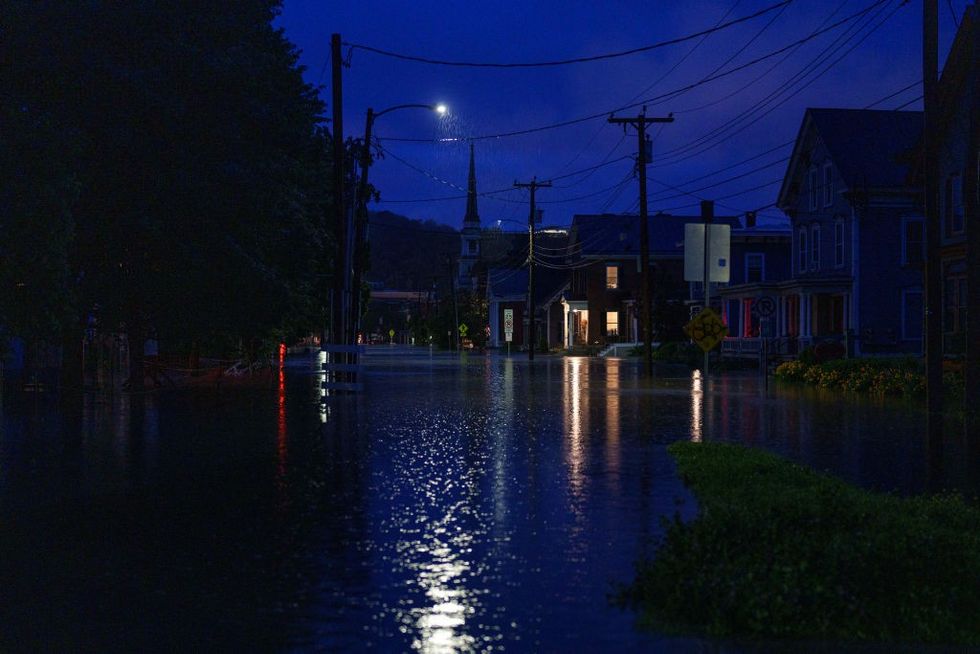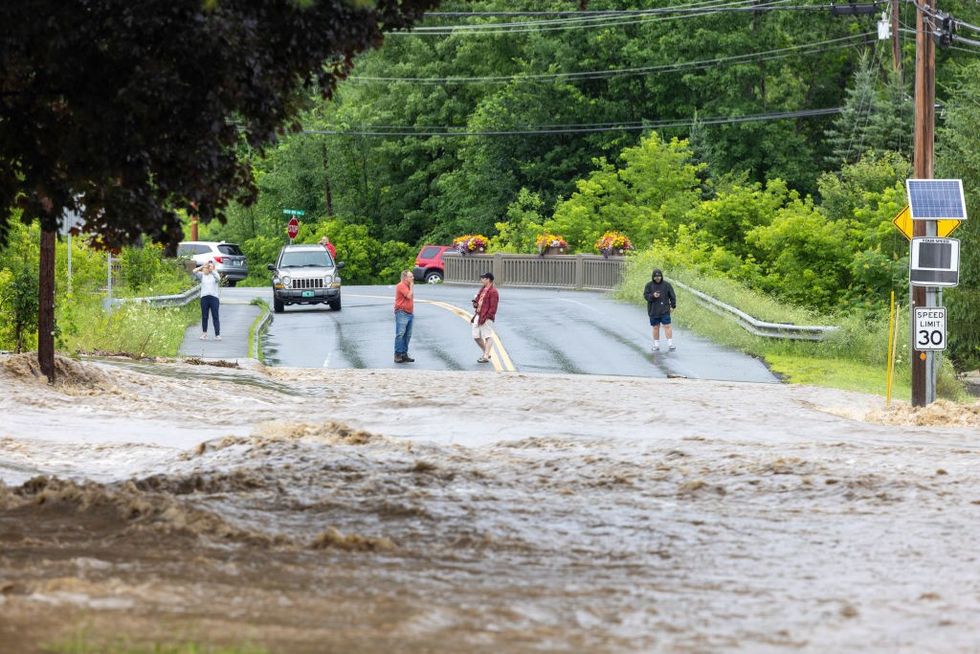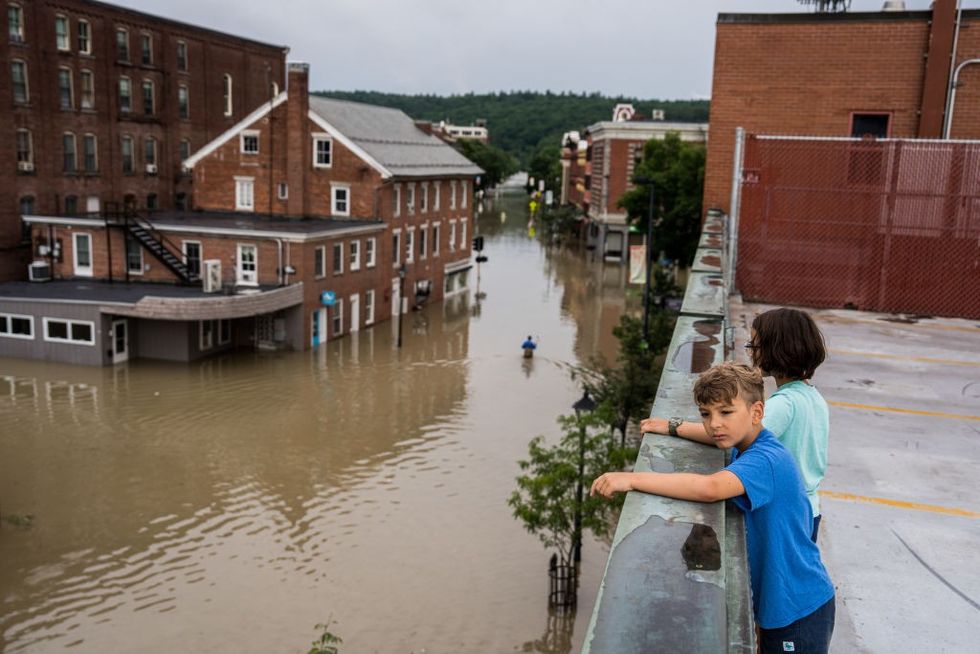

SUBSCRIBE TO OUR FREE NEWSLETTER
Daily news & progressive opinion—funded by the people, not the corporations—delivered straight to your inbox.
5
#000000
#FFFFFF
To donate by check, phone, or other method, see our More Ways to Give page.


Daily news & progressive opinion—funded by the people, not the corporations—delivered straight to your inbox.
'J.D.Vance came to Vermont for a get-away. Locals had other ideas'
Over a thousand Vermonters lined both sides of Route 100 in Waitsfield, Vermont, Saturday morning protesting Vice President JD Vance, who was visiting nearby Sugarbush Resort this weekend with his family.
Vance's ski vacation comes right after Friday's disastrous meeting where US President Donald Trump and Vance ambushed Ukrainian President Volodymyr Zelensky in the Oval Office.
Protesters shouted obscenities and waved signs as the Vance motorcade rolled past. "Vance is a traitor. Go Ski in Russia," one sign read.
'For too long, giant fossil fuel companies have knowingly lit the match of climate disruption'
The US Chamber of Commerce and the American Petroleum Institute - representing the biggest fossil fuel companies in the world - are suing the State of Vermont over its new law requiring fossil fuel companies to pay a share of the state's damage caused by climate change.
The lawsuit, filed last Monday in the US District Court for the District of Vermont, asks a state court to prevent Vermont from enforcing the law passed last year. Vermont became the first state in the country to enact the law after it suffered over $1 billion in damages from catastrophic summer flooding and other extreme weather.
Vermont’s Attorney General’s Office said as of Friday, Jan. 3, they had not been served with the lawsuit.
The lawsuit argues that the U.S. Constitution precludes the act and that the federal Clean Air Act preempts state law. It also claims that the law violates domestic and foreign commerce clauses by discriminating “against the important interest of other states by targeting large energy companies located outside of Vermont.”
The Chamber and the American Petroleum Institute argue that the federal government is already addressing climate change. Because greenhouse gases come from billions of individual sources, they claim it has been impossible to measure “accurately and fairly” the impact of emissions from a particular entity in a specific location over decades.
“For too long, giant fossil fuel companies have knowingly lit the match of climate disruption without being required to do a thing to put out the fire,” Paul Burns, executive director of the Vermont Public Interest Research Group, said in a statement. “Finally, maybe for the first time anywhere, Vermont is going to hold the companies most responsible for climate-driven floods, fires and heat waves financially accountable for a fair share of the damages they’ve caused.”
The complaint is an essential legal test as more states consider holding fossil fuels liable for expensive global warming-intensified events like floods, fires, and more. Maryland and Massachusetts are among the states expected to pursue similar legislation, modeled after the federal law known as Superfund, in 2025.
New York Gov. Kathy Hochul (D) signed a similar climate bill into law - the Climate Change Superfund Act- on Dec. 26, pointing to the need to fund climate adaptation projects.



"If you contributed to a mess, you should play a role in cleaning it up," said one supporter of a bill that could be a model for other states to follow.
This week, Vermont became the nation's first state to pass legislation requiring fossil fuel giants to pay for the damage and disruption caused by their planet-warming products, offering a model for others to follow.
While it remains likely Republican Gov. Phil Scott will veto the bill passed by the state Senate in March and the House on Monday, the legislation—now heading for his desk—was celebrated as a blueprint for others to imitate.
As Vermont Publicreported:
Modeled after the federal Superfund program, the policy would require companies like ExxonMobil Corporation and Shell to pay Vermont a share of what climate change has cost the state in recent decades. Vermont would use those payments to establish a program to fund recovery from climate-fueled disasters and work to adapt to the state’s already-changed climate.
Vermont could become the first state in the country to enact such legislation. New York, California, Massachusetts and Maryland are all considering similar bills, as is Congress.
The fossil fuel industry has opposed the measure and vowed legal action if it becomes law. In March, the American Petroleum Institute (API), which represents oil and gas companies, called the legislation "bad policy" and argued that it "may be unconstitutional" for holding corporations responsible for what society at large has done.
Evidence has shown, however, that the fossil fuel industry knew about the climate impacts of burning coal, oil, and gas for decades but hid those understandings from the public as it fought efforts to curb emissions or mitigate the damage being done.
"If you contributed to a mess, you should play a role in cleaning it up," Elena Mihaly, vice-president of the Conservation Law Foundation's Vermont chapter and a supporter of the bill, toldThe Guardian.
Like many other states, Vermont has suffered expensive damage from climate-related weather events in recent years—costs that proponents of the bill say should not be shouldered by the state alone when it's so clear the fossil fuel industry's role in creating the current crisis.
"You see towns across the state underwater, and communities and businesses financially devastated. The reality of the climate crisis just really comes crashing home," Ben Edgerly Walsh, climate and energy program director for the Vermont Public Interest Research Group, toldNBC News following passage in the House. "These are facts that we are dealing with in real-time that we need the financial resources to deal with."
If Scott vetoes the bill, the state House and Senate lawmakers would have to muster a two-thirds majority to override his rejection.